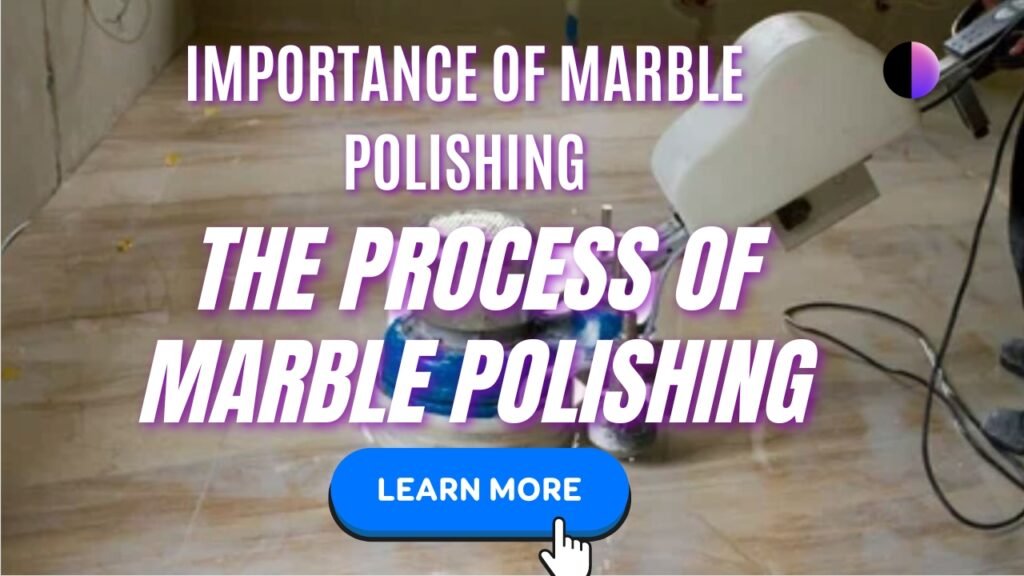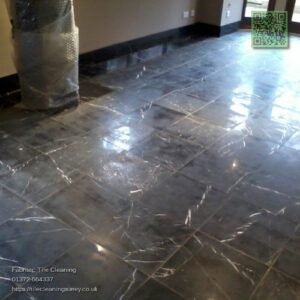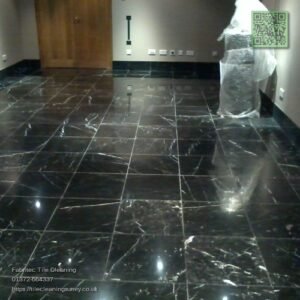People value marble surfaces in homes and businesses for their elegance. Marble needs regular cleaning to stay beautiful and last. This method boosts value, protects the environment, and improves spaces. Polishing is key to maintaining marble’s beauty and worth.
Understanding the Characteristics of Marble
Marble’s veining and elegance are valued. Marble flooring, countertops, and ornaments are beautiful and refined. Marble’s history and geology make it unique among natural stones, combining beauty and talent.
Marble is soft (Mohs hardness 3–4) and requires constant care to prevent scratches, stains, and etching.
Common Issues with Polished Marble
Etching, which happens when acidic materials like lemon juice or vinegar come into touch with the surface and leave dull patches, is a common problem with polished marble. Since marble is a relatively soft stone, scratches are another issue, particularly in places with heavy activity. Furthermore, polished marble can become slippery when wet. If spills are not wiped away, acid spills will cause etching. Gradually, polished marble will wear and lose its shine if not regularly re-polished.
The Process of Marble Polishing
Restoration and protection of marble surfaces are achieved through the process of marble polishing.
Assessing the Condition of Marble and Preparing for Polishing
Before polishing marble, professionals evaluate the level of wear and damage to determine the most suitable polishing technique. This step typically requires a thorough examination that combines visual and instrumental analysis to ensure that all underlying issues are correctly identified.
Ensuring Effective Marble Polishing through Thorough Cleaning and Preparation
Polishing starts by thoroughly cleaning the marble surface to remove surface soil and grit that may impede the polishing procedure. We use water-borne eco-friendly cleaning agents to minimise our environmental impact.
The secrets to achieving a stunning, natural shine for your marble surfaces.
Several techniques are employed to restore the marble’s shine, including diamond honing, diamond polishing, powder polishing, crystallising polishing, and buffing. Honing can smooth minor surface imperfections while polishing enhances the marble’s inherent lustre. Cutting-edge techniques such as ultra-fine diamond polishing pads achieve an exceptionally refined finish. The cost of polishing is approximately £30.00 per square metre, which may vary depending on the condition of the marble.
Protecting Marble Surfaces from Stains and Damage
Ensuring the longevity of your marble is essential, and sealing it is a vital step in this process. When sealed, polished surfaces stay pristine longer. This protective coating extends the lifespan of the shine, warding off wear and tear. Without sealing, lustre fades faster, robbing surfaces of their intended brilliance.
Sealants in the modern era are crafted to deliver optimal performance while prioritising environmental sustainability. These sealants effectively safeguard marble surfaces without harming the environment.
Benefits of Regular Marble Polishing
Regular marble polishing is essential for maintaining your marble surfaces’ timeless beauty, strength, and worth.
Improving the Aesthetics and Reflective Quality of Polished Marble Surfaces
With regular polishing, marble can regain its natural shine and beauty, becoming a captivating focal point in any space. Polished marble can also enhance lighting in a space, leading to improved energy efficiency.
Enhanced Durability and Increased Resistance to Wear and Tear with Regular Polishing
Polishing enhances the durability of the marble surface, increasing its ability to withstand daily use and minimise damage. By preserving the marble’s integrity and reducing the need for repairs, the lifespan of your surfaces can be extended.
Maximising the Value of Regular Marble Care through Cost-Effective Maintenance
Regular maintenance can help you avoid costly repairs and replacements, making it a cost-effective choice in the long run. If your floors have deep scratches, heavy wear, damage, or uneven tiles, you may need to consider grinding, also known as restoration. This process costs £80.00+ per square metre and requires 2 to 3 times more time than standard polishing. In addition, properly cared-for marble surfaces can greatly increase the value of a property, offering a substantial return on investment.
Hygiene benefits of keeping a polished marble surface in pristine condition
A polished marble surface makes cleaning and maintenance a breeze, creating a cleaner and more hygienic environment. Ensuring cleanliness is paramount in kitchens and bathrooms, as it directly impacts health and safety.
Exploring the Longevity of Marble Surfaces and Their Environmental Footprint
Regular polishing of marble surfaces helps extend their lifespan, reducing the need for new materials and promoting environmental sustainability. This practice aligns with broader goals of reducing resource consumption and minimising waste, making it a sustainable choice.
The Importance of Homeowner Maintenance
Regular maintenance is essential for homeowners looking to keep their marble surfaces in pristine condition and ensure the longevity of professional polishing.
- For regular maintenance, using a soft broom or vacuum cleaner with a soft cleaning head is best to remove dry soils and debris that may cause scratches.
- When cleaning marble surfaces, use a pH-neutral cleaner specifically designed for marble. This prevents damage caused by acidic or alkaline substances.
- For optimal marble cleaning, try using a damp microfiber mop. This method effectively prevents excessive moisture and ensures that dirt and debris are not stuck in the grout lines.
- Promptly clean up any spills to prevent them from leaving permanent stains. Spills caused by acidic substances, like citrus fruits or wine, will cause etching.
- Encouraging a no-shoes policy indoors or placing a doormat at entrances can help minimise the amount of dirt and grit that gets tracked onto marble floors.
- Ensure the safety of your furniture by attaching protective pads to the legs. These pads will prevent any unsightly scratches when moving your pieces around.
- For optimal protection against stains and damage, it is recommended to reapply a high-quality marble sealant regularly.
Professional vs. DIY Marble Polishing
With expert knowledge and specialised equipment, professional marble polishing delivers exceptional results, precise workmanship, and long-lasting protection that surpasses what DIY methods can achieve.
- Although attempting to polish yourself may appear cost-effective, it will not deliver the same precision and effectiveness as professional services.
- Homeowners cannot access the high-quality equipment and products that professionals use. In addition, attempts at doing it yourself often lead to damage that necessitates expensive repairs.
- The Benefits of Hiring Professionals: Marble polishing professionals have the expertise, specialised equipment, and top-notch products to deliver exceptional results. They can tackle a variety of problems and achieve a polished outcome. Professionals are always up-to-date with the latest techniques and products, guaranteeing the highest level of care for your marble surfaces.
- Comparing Costs: Professional services may have a higher upfront cost, starting at £30.00 per square metre. However, considering the long-term benefits and the avoidance of DIY mishaps, it becomes a more economical choice. Investing in professional services ensures that your marble surfaces are handled by experts, giving you peace of mind.
Choosing the Right Marble Polishing Service
Ensuring your marble surfaces receive the best care and achieve a flawless, long-lasting finish is crucial when selecting a marble polishing service.
- When choosing a marble polishing service, consider its experience, reputation, and customer reviews. These factors can help you make an informed decision. Working with a reputable company that has received positive feedback increases the likelihood of receiving excellent results.
- Furthermore, consider seeking services that provide a thorough maintenance plan to guarantee continuous care for your marble surfaces.
- Ask about their methods and products, their experience with similar projects, and any guarantees they provide for their work. It’s crucial to consider their approach to sustainability and environmental impact.
- Here are some local recommendations: In the Surrey area, you’ll find Fabritec Tile Cleaning, a trusted service specialising in marble polishing. They are known for their exceptional skills and ability to deliver top-notch results at reasonable prices. Seek out local businesses demonstrating a proven history of success and a dedication to ensuring customer happiness.
Regular care and polishing are essential for maintaining the luxurious look and increasing the value of marble surfaces. This process includes evaluating the marble’s condition, performing a comprehensive cleaning, and utilising polishing techniques to restore its shine.
Ensuring the marble is sealed adequately after polishing is essential for its protection.
Regular marble polishing provides numerous advantages, such as improved aesthetics, increased durability, cost-effective maintenance, and enhanced hygiene.
To keep marble surfaces in top shape, homeowners must implement some maintenance practices. This includes regular sweeping and utilising cleaners that have a pH-neutral formula. Hiring professionals who specialise in marble polishing is highly recommended for the best possible outcome. When selecting a marble polishing service, it’s essential to consider their level of expertise, the reputation they have built, and the feedback from their customers.
FAQs on Marble Polishing
What is the most effective method for polishing marble at home?
Begin by cleaning the surface using a gentle detergent and water for marble polishing at home. Next, apply a commercial marble polishing paste using a soft cloth, gently rubbing it in circular motions. Testing in a discreet spot is essential to ensure your satisfaction with the outcome. For more pronounced scratches or stubborn stains, it will be necessary to seek professional polishing services.
What is the recommended frequency for polishing marble floors?
Marble floors require polishing every 1–3 years, considering factors such as foot traffic and wear. To maintain the shine and durability of high-traffic areas, it may be necessary to polish them more frequently.
Is vinegar safe to use for cleaning marble surfaces?
Vinegar is quite acidic and can harm marble surfaces, causing etching and a loss of shine. To prevent this, a pH-neutral cleaner specifically formulated for marble is recommended.
How can I tell if my marble requires polishing?
If you notice dullness, visible scratches, etch marks, or staining on your marble surfaces, it’s a clear sign that they need polishing. When marble loses its reflective quality, it’s a good idea to have it professionally polished.
Is professional marble polishing worth the investment?
Investing in professional marble polishing is worth the cost. Professional polishing enhances the natural beauty of your marble, improves its durability, and extends its lifespan. It provides a budget-friendly option for rejuvenating tired marble surfaces.
Relevant Hyperlinked Sources:
The post Introduction To Marble Polishing – Protect Your Investment By Maintaining A Perfect Finish is brought to you by Marble Polishing Wimbledon
The Article Marble Polishing Protecting Your Investment appeared first on https://fabritec.org
The Article Marble Polishing Protecting Your Investment Was Found On https://limitsofstrategy.com





I found your discussion on the importance of marble maintenance to be incredibly insightful, especially considering how much we value marble for its beauty and elegance in our spaces. Living in a home with marble countertops, I’ve experienced the challenges you outlined firsthand. The thrill of having a polished marble surface can sometimes be overshadowed by the anxiety of keeping it pristine.
I totally understand where you’re coming from. Marble truly has that undeniable charm that elevates the design of any space, but the upkeep can be a real balancing act. I’ve had my share of moments where I’ve walked into the kitchen with a bit of anxiety, wondering if that one slip with a red wine glass would ruin the evening.
I recently came across a great resource on patio maintenance that really resonated with the challenges of keeping beautiful surfaces like marble looking their best; it offers some practical tips that might be just what you’re looking for.
‘Power Clean Patios.’
https://pier3.org/power-clean-patios/.
I really appreciate the insights shared in this post about the importance of marble care. It’s fascinating how a natural stone like marble can tell a story through its unique veining and textures—there’s something almost artistic about each slab that makes it so desirable for both residential and commercial spaces. Marble surfaces have a timeless appeal, but I often wonder about how we can balance its beauty with the practical considerations of maintenance.